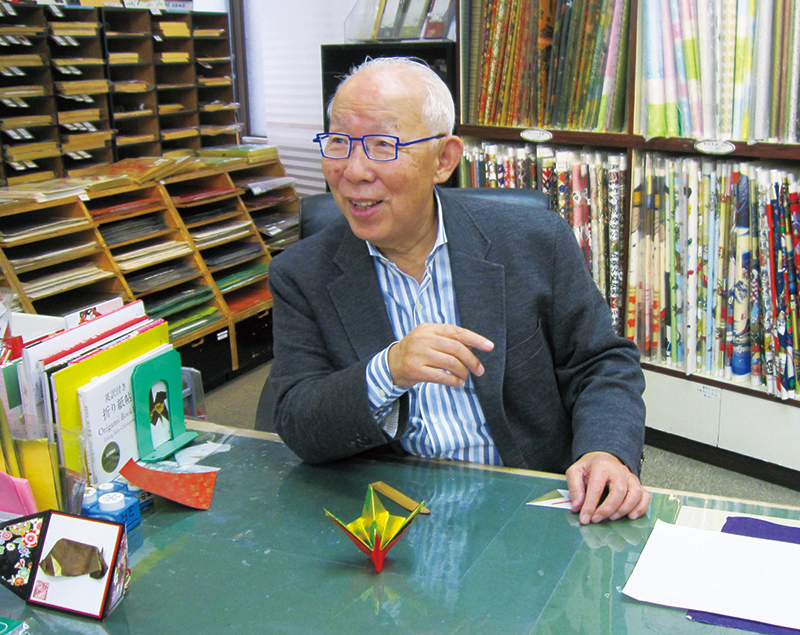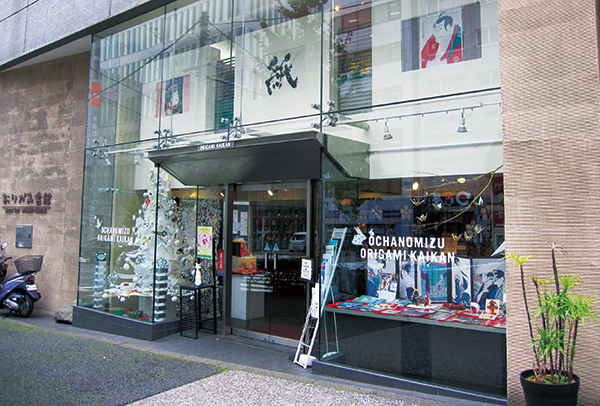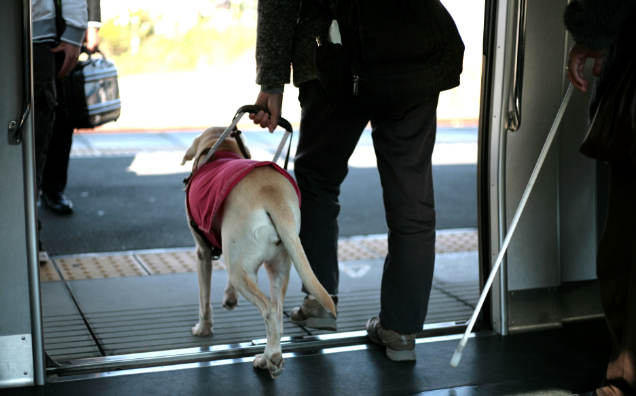- TOP >
- Efforts of Ochanomizu Origami Kaikan
Efforts of Ochanomizu Origami Kaikan 1-7-14 Yushima, Bunkyo-ku, Tokyo
Barrier-free communication through paper: kami-nication
Creating a place where origami is used to communicate in a way that goes beyond barriers
Origami Kaikan was founded in 1858. At the shop on the 3rd floor–where the director does demonstrations–one can find various people from both within and outside Japan every day. Here, origami is used to widen the circle of communication to go beyond language and disability-related barriers. Kazuo Kobayashi, the director, talked to us about the center's specific efforts.

Customers who are extremely diverse in terms of age, nationality, and whether they have disabilities
Our center got its start as a dyed-paper business in 1858. Currently, we manufacture and sell origami and chiyogami paper, hold various classes, and actively hold events outside the center as well, including demonstrations at department stores, etc. as well as exhibitions. In addition, we participate in many events and ceremonies overseas. For example, in 1980–for the first time in the history of the washi (traditional Japanese paper) industry–we did a full-scale washi demonstration in Honolulu, Hawaii and participated in Paris Fashion Week.
We have a wide range of customers, including everyone from children to elderly people. We also have a lot of disabled customers, including people with intellectual, developmental, physical, and hearing disabilities. Some of the hearing-impaired people regularly come with guides as well. I suppose some people are bothered by disabilities, but we have no problem with them, so we encourage anyone to come visit us.
Groups from children's homes, retirement homes, etc. also come to the center, and there has been more interest from overseas recently as well.
Our building is barrier-free. The stairs on the 1st floor have a lift, and an elevator is available for going up starting on the 2nd floor.
In addition, our 3rd-floor restrooms are spacious, so wheelchair users can use them as well.
The attraction of origami that does not have to be neatly folded
We run our center based on the concept that all people are welcome. Anyone who has a sheet of paper can enjoy origami. I don't believe whether a person has a disability is a problem when it comes to origami.
Some disabled and elderly people worry that they won't be able to make neat folds or align the edges, but there's not actually a need to make neat folds, and edges can be aligned by cutting them if necessary. The essence of origami lies not in the skills of the folder but rather in enjoying the process and bringing other people joy. When I tell people this, they realize that there is no need for their origami to be perfect, and then they stop worrying. If someone does end up needing help, it's fine for them to get it from the people around them. This builds connections between people and helps to make our center a fun place to fold origami.

Origami goes beyond communication barriers
There are no communication barriers when it comes to origami. One of origami's charms is that it can be used to achieve communication between people regardless of their age, gender, nationality, or disabilities. We refer to communication through origami as kami-nication.
Many people with developmental disabilities, autism, and similar conditions are good at focusing on one thing, so I think they have a natural talent for origami. Many people also become engrossed in origami at our workshops, etc.
Visually impaired people also visit our center, but they can fold origami without any problems. By touching the origami, they can keep track of the position of the paper, which enables them to fold extremely neatly. There really are a wide variety of people at our center. We don't have any predefined notions of how to deal with our customers. Instead, we keep a close eye on the people we deal with as well as the situation in order to come up with ways to effectively communicate and help them enjoy themselves. Origami does not belong to any one person or group, and you don't need any certification to teach it. We hope to continue conveying both the spirit of Japan and the beauty of origami as part of traditional Japanese culture.
 social media accounts
social media accounts
Tokyo, a city that is accessible everywhere to anyone.
Sightseeing where you wish, as you wish.
This ability to travel anywhere you please makes life that much richer.
Tokyo welcomes your visit.
Here you can encounter tradition,
history, culture, nature, technology,
and, best of all, smiling faces.
Making tourism closer and more
enjoyable through accessible tourism.




